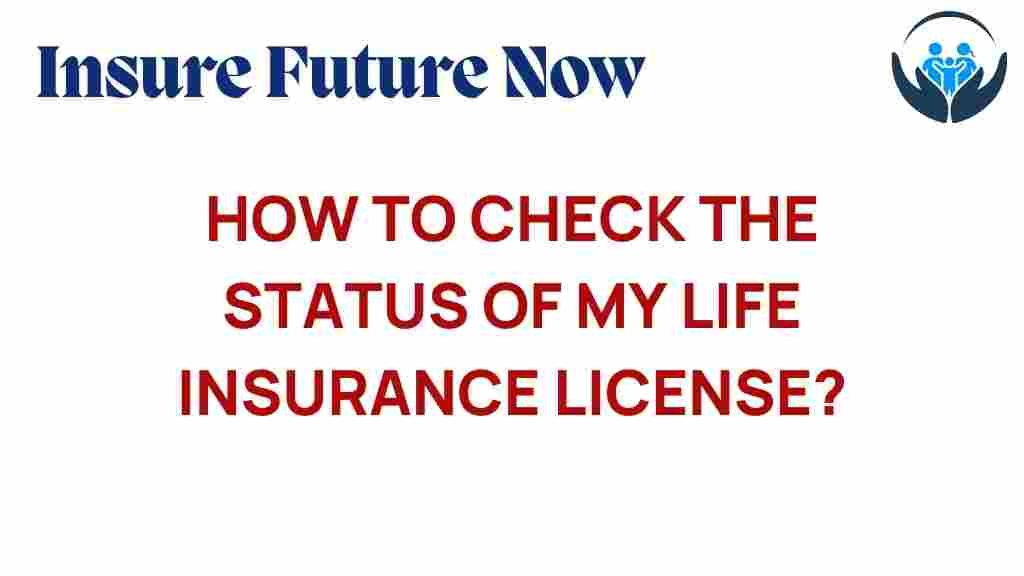Unlocking the Secrets: How to Check Your Life Insurance License Status
Understanding your life insurance license status is crucial for any insurance agent. Whether you’re a new entrant in the field or a seasoned professional, staying compliant with insurance regulation is essential for your career advancement. This article will guide you through the process of checking your license status, the importance of maintaining compliance, and the necessary steps to ensure that you meet state requirements.
Why Checking Your License Status Matters
As an insurance agent, your license status is more than just a piece of paper; it signifies your ability to operate legally in your state. Here are several reasons why you should regularly check your license status:
- Compliance: Ensuring that your license is active helps you avoid legal issues.
- Career Advancement: A valid license opens up new opportunities for job placements and promotions.
- Trust: Clients trust licensed agents, and maintaining a good standing builds credibility.
- State Requirements: Each state has specific regulations regarding the maintenance of insurance licenses that must be followed.
Step-by-Step Process for Checking Your License Status
Checking your life insurance license status may seem daunting, but it can be accomplished in a few straightforward steps.
1. Identify Your State’s Insurance Department
The first step in checking your license status is to determine the insurance department for your state. Each state has its own regulatory body responsible for overseeing insurance agents and their licenses. You can find a list of state insurance departments on the NAIC website.
2. Visit the Insurance Department’s Website
Once you have identified your state’s insurance department, visit their official website. Most state insurance departments have a dedicated section for checking license status.
3. Enter Your Information
On the license verification page, you will be prompted to enter specific information. This may include:
- Your full name
- Your license number (if you have it)
- Your date of birth
Make sure that the information you provide is accurate to avoid any discrepancies.
4. Review Your License Status
After entering your information, you will be able to view your license status. The system will typically inform you whether your license is:
- Active
- Expired
- Suspended
- Revoked
Pay close attention to any conditions or requirements that may be associated with your license.
5. Print or Save Your License Status
Most state websites allow you to print or save a copy of your license status. This can be helpful for your records or for job applications that require proof of your active status.
Troubleshooting Tips
If you encounter issues while checking your license status, here are some troubleshooting tips:
- Incorrect Information: Double-check the information you entered. Even a small typo can lead to incorrect results.
- Website Issues: If the state website is down, try again later. You can also contact their support for assistance.
- Expired License: If your license is expired, look for renewal options on the website. Each state has its own renewal process.
- Suspended or Revoked License: If your license is suspended or revoked, contact your state’s insurance department immediately to discuss your options.
Understanding State Requirements for Insurance Agents
Each state has its own set of requirements regarding professional licensing for insurance agents. Here are some common state requirements:
- Pre-licensing Education: Most states require completion of a pre-licensing course.
- Examination: Passing a state-administered exam is mandatory.
- Background Check: A criminal background check may be required before issuance of a license.
- Continuing Education: Many states mandate ongoing education to keep your license active.
It is essential to familiarize yourself with your state’s specific requirements to ensure compliance and avoid any issues with your license status.
Maintaining Compliance as an Insurance Agent
Once you have obtained your life insurance license, maintaining compliance is vital for your career. Here are some tips for staying compliant:
- Renew Your License on Time: Keep track of your renewal dates to avoid lapsing.
- Complete Continuing Education: Fulfill any continuing education requirements as mandated by your state.
- Stay Updated: Regularly check for any changes in insurance regulation that may affect your license.
- Document Everything: Keep records of your continuing education and any communications with the insurance department.
Conclusion
Checking your life insurance license status is a straightforward process that can significantly impact your career as an insurance agent. By following the steps outlined in this article, you can ensure that you remain compliant with insurance regulation and avoid any legal issues that may arise from an inactive or expired license. Regularly checking your license status not only promotes trust with your clients but also aids in your career advancement.
For more information on checking license statuses and understanding state requirements, consider visiting the NAIC website or your state’s insurance department website. Remember, staying informed and compliant is key to a successful career in the insurance industry.
This article is in the category Providers and created by InsureFutureNow Team
